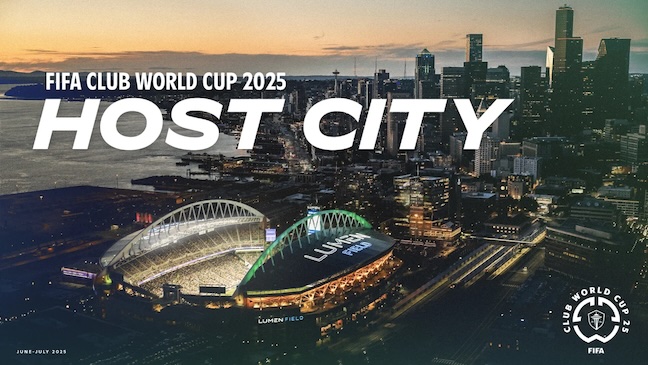Seven Q&A’s for Scoring the FIFA World Cup Impact
Already a renowned sports city with a fervent soccer fanbase, Seattle is set to co-host the 2026 FIFA World Cup. The city known for its iconic stadiums and passionate supporters is one of 11 U.S. cities selected to hold matches. Seattle’s Lumen Field will host four group stage matches, which are slated for June 15, June 19, June 24 and June 26. The U.S. team will play in the June 19 match. Seven more matches will be held just up I-5 in Vancouver. The Finals of the tournament will be played at MetLife Stadium in New Jersey/New York on Sunday July 13, 2025.
Beyond the stadium, Organizing Committee CEO Peter Tomozawa has announced that a long-planned “Fan Celebration” will take place on the Seattle Center grounds, extending from MoPop to Fisher Pavilion and the Pacific Science Center and hosting live concerts and viewing parties for the entire World Cup. A local transportation loop will be created to connect Lumen Field, the Seattle waterfront and Seattle Center.
What are the economic benefits to the City of Seattle?
According to various economic forecasts, Seattle could see an influx of several hundred million dollars in direct and indirect spending as soccer fans from around the world descend on the city. Local hotels, restaurants, and retail businesses will benefit from this surge in tourism, as will the hospitality industry at large. The Seattle Sports Commission estimates that hosting World Cup games could generate between $90 and $480 million in revenue for the region.
What kind of job creation and infrastructure improvements are expected?
Preparing for an event of this magnitude requires significant investment in infrastructure, from transportation improvements to enhanced facilities. This creates jobs across various sectors, including construction, hospitality, and security. While Seattle’s transit infrastructure, including its light rail system, is already robust, hosting the World Cup may accelerate planned projects, improving mobility and connectivity for residents and visitors alike.
How will the World Cup focus the eyes of the world?
The global stage of the World Cup will shine an international spotlight on Seattle. Every one of our six games is expected to be viewed by 200 million people As millions of fans tune in from around the world, Seattle will have the opportunity to market itself as a premier destination for travel, investment, and culture. This kind of exposure can have long-term benefits, boosting international tourism beyond the duration of the event. FIFA president Gianni Infantino hailed the tournament as a “new era for club football” and added: “This new FIFA competition is the only true example in worldwide club football of real solidarity and inclusivity.”
What will the World Cup mean for Seattle soccer and sports culture?
Seattle is already known for its vibrant soccer culture, with the Seattle Sounders being one of Major League Soccer’s most successful franchises. Hosting the World Cup will further solidify the city’s reputation as a soccer hub, inspiring a new generation of fans and athletes. This legacy can lead to increased investments in youth soccer programs, stadium upgrades, and further development of local sports infrastructure.
What are the biggest challenges is hosting the event?
The scale of the World Cup could put immense pressure on public transportation. With tens of thousands of fans expected for each match, concerns about traffic congestion, parking, and public transit capacity have been raised. While projects like the expansion of the Link light rail are already underway, ensuring that the city can handle the surge in visitors will be a significant logistical challenge.
What are the needs for housing during the event?
Seattle, like many cities on the West Coast, faces housing affordability issues. The influx of tourists and the demand for short-term rentals during the World Cup could exacerbate the city’s housing problems. There is concern that property owners may convert long-term rentals into short-term Airbnbs or hotels, putting additional pressure on an already tight rental market. Local governments and organizations will need to manage these issues to avoid displacing residents or worsening the housing crisis.
What will be required for security and safety?
Ensuring the safety of fans, players, and residents is a top priority for any major event. The scale of the World Cup means that local law enforcement, emergency services, and private security firms will need to collaborate closely to manage the crowds and mitigate potential risks. Large-scale events often come with concerns about terrorism, cyber threats, and crowd control, all of which Seattle must be prepared to address.
What are the revenue projections and economic impact from the event?
Beyond the immediate financial injection, there are long-term economic benefits. The World Cup’s visibility can attract future tourists, business investors, and events to the city. The exposure may also lead to increased sponsorship deals and partnerships for Seattle’s sports teams, including the Sounders.
A Transformative Opportunity
The opportunity to host part of the 2026 FIFA World Cup represents a transformative moment for Seattle. The event promises to generate significant economic benefits, reinforce the city’s standing as a global sports destination, and leave a lasting legacy for soccer in the region. However, Seattle will need to address key challenges related to infrastructure, housing, and security to ensure the event’s success. If managed well, the 2026 World Cup could catalyze a new era of growth and international recognition for Seattle. [24×7]
The Kicker: Key Data Points
The 2026 World Cup will include 48 teams and 104 matches. Seattle is preparing to host six matches at the 2026 FIFA World Cup, including two knockout games, four group-stage games, and one Round of 32 fixture. The city’s plans include:
• Lumen Field: The stadium will host matches in June and July. The Washington State Legislature is funding upgrades to the stadium, including new seating.
• Seattle Center: The 74-acre campus will host a World Cup Fan Celebration. The event is intended to celebrate children and interest them in science.
• Waterfront Park: The Fan Fest will take place on Pier 62/63.
• App: The local organizing committee is creating an app to provide fans with information about where to go.
• Hybrid grass: The committee is growing and testing hybrid grass in Moses Lake.
• Transportation, security, and hospitality workers: The committee is recruiting and training workers in these areas.
• Chief Legacy Officer: Seattle was the first FIFA World Cup 2026 Host City to appoint a Chief Legacy Officer.
• Chief Legal and Administrative Officer: Felipe Mendez leads the legal, risk management, human resource management, and volunteer program development.





















